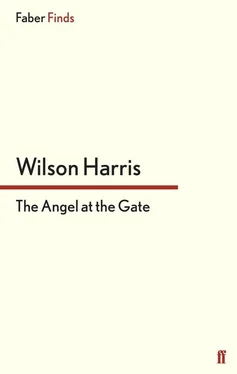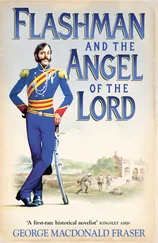John was happy again. He waved his scissors at the trees, at the sky, at the ground. Narcissi fell at each stroke upon a carpet of grass within a huge enclosure at which they had arrived; clumps of bush and trees appeared from which emus strolled followed by leghorn fowl and a cock with a bright, scarlet comb. Then came the crested cranes and the peacocks with starred feathers, all of which John had randomly created. Flamingos drew close to the fence and danced to each scissored slash of unbruised flesh blissfully unconscious of their bruised mates the gang had killed. Not John. He instinctively knew.
He paused, scissors of blossom suspended. The way was suddenly open for Sukey Tawdrey and a young man to come into sight along another path from Paradise Park tea-rooms. There was no sign of Jenny Diver. Sukey was black, her hair in rings and her skin bright and blossoming. The light winter coat that she wore — suggestive more of spring than of winter on this mild day — accentuated her hips. Her eyes darted with gaiety and pleasure until they almost seemed on the point of falling into the hands of the young man at her side. With such eyes he would secrete a weapon to stone the heart of Mack the Knife.
As for John, he secreted himself in Mary’s heart and seized Sukey’s eyes before the young man could gasp; split-second seizure, unique child-thief, unique child-creator with creatress eyes in his head. They glistened there uncertain of the bite of the womb in the human brain. Mary recalled the Indian child-bride in Gandhi theatre. Now in Paradise drama, it was miracle groom who confronted a woman ten times his age. He waved his scissors at her and at a flamingo. The flamingo’s bitten neck darted across the woman’s body into the brain of the serpent. Sliced evolutionary wings grew afresh on the other side of the woman’s thighs into the apparition of a swan. Then wings enveloped the scene to disclose a rim of black under a scarlet ribbon of feathers. This startling climax pulled the woman around to face her diminutive tormentor. She was filled with fear (Mary’s fear as well) that a child whom she could consume could strip her of vision….
That stripping of vision into diminutive scale invoked another aspect of all that had happened. Somewhere in the depths of nature, brain and womb had randomly married under an elusive regime of grace to lighten and darken the human heart. Mary had always pretended that her mother Jenny lived — larger-than-life — around the corner to help with John. This was not so. It was unhappiness that made her pretend to see through the shawl of death; it was ambivalent legacy she still had to overcome. Now that Stella had departed her fear, if anything, had increased. The eyes that patently should lodge in John’s head should be Jenny’s, grandmother in grandson.
But now beyond a shadow of jealous doubt John resembled Sukey Tawdrey in the way his mind flashed and his face seemed to darken into hers. They were cousins. It would take time to unravel the riddle. Legendary Sukey Tawdrey (legendary worth as much as worthlessness) had borne Mack the Knife a child years before he married Jenny. And that child had had a child…. Mary remembered it all though it remained vague and reticent. She would need to sleep, to dream, to bring it all back into automatic perspective.
In the meantime John waved his scissors. Halve thirty. Mary fled back to evolutionary year of grace 1769 and the eleven-to-fifteen-year-old girl who had been bought at a sale in London by one Marsden. That girl was a distant antecedent of herself and of John. She stood now in the young woman in the Park. Her plucked eyes roamed space beside an enclosure of admired, yet endangered creatures two hundred and more years later. “Mimicries within unravelled mimicries,” Joseph had said. The family of Mack the Knife was composed of jealous slices and resemblances, divisions within divisions within divisions.
The flamingos were cavorting upon the bed of narcissi where eighteenth-century Marsden was buried in Paradise Park though no one knew. Living epitaph.
First, as they danced, one noticed the imperceptible yet vaguely outlined miniature hump on their backs. The camel of god on which invisible soul rides. Living epitaph.
Second, one noted the taut twine of their legs, so apparently fragile, so whittled and shaven, it seemed to tie them into premises of space as if they were alighting less on earth than on another planet, space-ship flamingo on which invisible soul sails to another world. Living epitaph.
Third, the swan-like neck was tipped at its extremity with a head and a black beak, phallus of soul. Living epitaph.
Fourth, the scarlet edges upon the wings were automatic fires of dawn and noon and sunset. Living epitaph. Funeral pyre.
They were all “divisions within divisions” of bruised creation (slain by the gang) and marriageable creation (invoked by John), slain antecedents felled by lust or violence, yet evolving relations through sliced kith and stranger kin, memorial slice matching animate slice, densities of re-born illumination and configuration, random, paradoxically exact, in past and present lives in Mary’s hypnotic expedition through regions and riddles of spirit.
Mary and Sebastian were in bed a couple of nights or so after Paradise Park. Sebastian sound asleep, Mary listening to the hypnotic blow of the wind that had arisen and the rain beating softly upon the window. The house in Dolphin Street was sailing in space. With Stella’s departure, the twinship between herself (Mary) and Sebastian had broken, Mary felt, into stages of reversed transference of heightened spirituality from Father Marsden (her larger-than-life psychiatrist and captain or sailor upon a ship of souls) to other related, obscure global presences and antecedents.
She could still recall Stella’s body and shadow lying between her and Sebastian, and her desire (“my desire,” she said to herself to distinguish herself sharply from Stella) to remain frozen and irreversibly apart from her husband by becoming his fantasy twin and yielding the position of wife to Stella. Thus it was possible to feel everything and still feel nothing of sexual intercourse, to transfer unconscious egg and foetus — when she became pregnant in June 1977—from herself to Stella as if Stella were a legitimate extension of larger-than-life Father Marsden and the child was more his than Sebastian’s.
Now that reversed transference had set in, she appreciated all the more Father Marsden’s qualities of persevering victim through which John himself, her child and Stella’s child, began to come strangely into his own — as if his two fathers and two mothers were no longer alienated and antagonistic but suffused by a stranger and more extraordinary veil-in-depth. In that veil Stella gave way to a new complication through which Mary perceived Sebastian. That complication was Mother Jenny Diver and it seemed to arise from the very deeps of a kingdom of mothers over-arching dual fatherhood.
The sheltered bedside lamp beside her by which she read sometimes far into the night cast its luminous, half-mothering, half-consuming Diver shadow upon Sebastian. He was slowly sinking into the sea over which they hypnotically sailed. Mary was reminded of her disappointment in Paradise Park when Jenny had failed to keep an appointment and only Sukey Tawdrey had appeared.
That disappointment had partially shattered a certain lucidity of expectation, a larger-than-life mirror or pool of rainwater in Father Marsden’s head, translucent shroud, in which Jenny resided. Even with the onset of reversed transference, it had been hard to dislodge Stella from such dominant father in Proudhon’s Karl Joseph though the pool of larger-than-life dialectic dwindled into clockwork Utopia, minute hand striking a hypnotic, funeral, celebrative drum of time, the death of an age, the re-birth of an age.
Читать дальше












